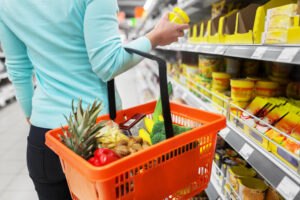
Almost a quarter of British households are struggling to make ends meet as grocery prices increase at the fastest pace in 13 years, research shows.
Food prices in supermarkets have risen by 7 per cent in the past four weeks compared with the same time last year, the highest level since May 2009, according to figures released by Kantar, the data analytics company.
The figures come just days after Andrew Bailey, governor of the Bank of England, warned that consumers were facing “apocalyptic” food prices.
Fraser McKevitt, head of retail and consumer insight at Kantar, said: “People are really feeling the squeeze at the supermarket tills and they’re having to stretch their budgets further to accommodate rising prices.”
The cost of a family fry-up comprising toast, eggs, sausage, bacon and beans now costs £6.83, 40p more than a year ago.
Archie Norman, who has chaired Marks & Spencer since 2017, said last week that food prices could go up by 10 per cent this year.
However, other food industry sources have said that they could reach 15 per cent and have said that estimates have proven to be too conservative so far.
Norman tried to caution about shoppers being “too panicked” but he joined a growing number of bosses warning that consumers will feel the pinch in the autumn, after many have spent their lockdown savings on holidays, and then face a huge increase in their energy bills.
A survey of households by Kantar revealed that while 43 per cent said they were “managing”, 22 per cent said they were struggling to make ends meet. Meanwhile 90 per cent of people said they were concerned about higher food bills.
Disruption to global supply chains and higher energy prices have been exacerbated by Russia’s invasion of Ukraine, which has particularly affected the price of wheat and sunflower oil. This is also pushing the price of substitute oils, such as palm oil and vegetable oil, higher as food manufacturers switch recipes.
Despite fears about rising prices, preparations for the Platinum Jubilee celebrations are helping to lift sales, with sales of sparkling wine doubling. As a result supermarket sales over the past four weeks dipped by just 1.7 per cent, compared with a 4.4 per cent fall over a 12-week period to May 15.
Inflation concerns mean that Aldi and Lidl were the only supermarkets to grow sales last month, up 6 per cent and 5.8 per cent respectively, as shoppers switched to budget options.
Read more:
Grocery prices rise at fastest pace in 13 years






